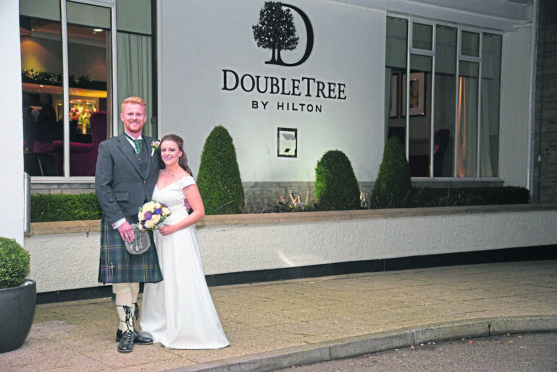I had not heard of Aberdeen University Medical Society until a few days ago, but I would have assumed they were a fairly austere and studious bunch with heads buried in a mountain of medical works and earnest discussions.
That was before their paths crossed with a newly-wed couple enjoying their nuptials at separate functions in a Aberdeen hotel.
It seems the medical students should have carried a government health warning, such were their wild antics, as they were accused of ruining the wedding reception while they were at it.
It is not known if they are suitably contrite and remorseful, or maybe celebrating their depressing behaviour as a badge of honour, but it highlights a fine line between having a good time and becoming a menace to others.
Are are we doing enough to confront it head on and change behaviour? Respect for others has been melting as fast as polar ice caps over several generations.
Not to put too fine a point on it, all hell broke loose as some of the students, their followers or guests, or whatever they were, went on a “rampage” as the wedding party’s jaws dropped in stunned unison.
Sadly, we are not wired to live together peacefully and in an atmosphere of respect. Far from it – we just annoy each other either deliberately or unwittingly, as we often seem oblivious to other people’s feelings anyway. It is in our nature to be at war with each other.
Ask a group of people to pass judgement on the hotel incident and some might say, “Oh, they were only letting off steam. They are young. Let them have fun.”
A lot of others would say, “They were a intimidating, frightening and disrespectful.”
This type of thing happens every day somewhere, but on lots of different levels.
For example, in close proximity we are wary of fellow air passengers or people sitting at the next restaurant table and quickly start assessing if they are going to be a pain in the backside.
Antisocial neighbours can condemn us to round-the-clock hell.
Back at the hotel, one shell-shocked guest asked quite reasonably in the circumstances, “Is this the future of the NHS?”. The implication being how can these oafs be fit people to look after anyone in their later careers?
Eye-witnesses claimed they were vandalising property, threatening people and smashing glasses and crockery on the car park. Maybe it was preparing them for the rigours of our modern stressed-out NHS after all.
One senior citizen within the wedding party suffered a gashed head after falling while trying to escape the mayhem and madness.
The medical students probably knew that the shoulder bone was connected to the neck bone and the neck bone was connected to the head bone, as the famous song Dem Bones goes, but their brains seemed disconnected.
Do councils and the police do enough to stop this type of thing when it looks in danger of crossing the line into potential arrestable behaviour?
There are special joint police-local authority teams fighting anti-social behaviour, but how successful are they? I don’t see much evidence apart from the most serious acts of violence coming to court.
As often happens in such matters, the victim’s voice often goes unheard and they are condemned to suffer in silence as offenders make a mockery of the authorities.
Anti-social behaviour officials pushing leaflets through offenders’ front doors urging them to be quiet is hardly going to have much effect and the legal system is unbearably slow. It is of no use if your life is torture day in day out.
The hotel drama should probably have involved the police at some point. The university authorities might take action, but who knows as they don’t tell anyone about these things as a rule.
Residents who live close to universities have to put up with similar antics, but even when they are happening away from college premises, long-suffering neighbours are entitled to expect universities – who are making lots of money out of it – to bear responsibility.
Even calling the police is not always the solution. They would probably tell you to call the council in the morning unless there are serious public order offences happening in front of their eyes.
A call to 101 shows that the police are handcuffed to call-centre syndrome. You know the sort of thing – you call up and go through the auto-message process before trying to convince a call handler that your personal nightmare is worth passing on to a uniformed officer.
It’s like trying to get a gas engineer or plumber to come out, but maybe harder.
Young people will be young people, of course. It’s a rite of passage after all. Battle of Britain pilots often had a crazy social life (with good reason, of course) and the infamous Bullingdon Club at Oxford included such luminaries as David Cameron and Boris Johnson.
But does it have a nasty side to it today? It’s probably too late to turn back the tide that has been eroding common everyday respect and become a greater malaise in society over several generations.
It’s going on all around us, but the authorities seem powerless to do much about it even when a line is crossed.










